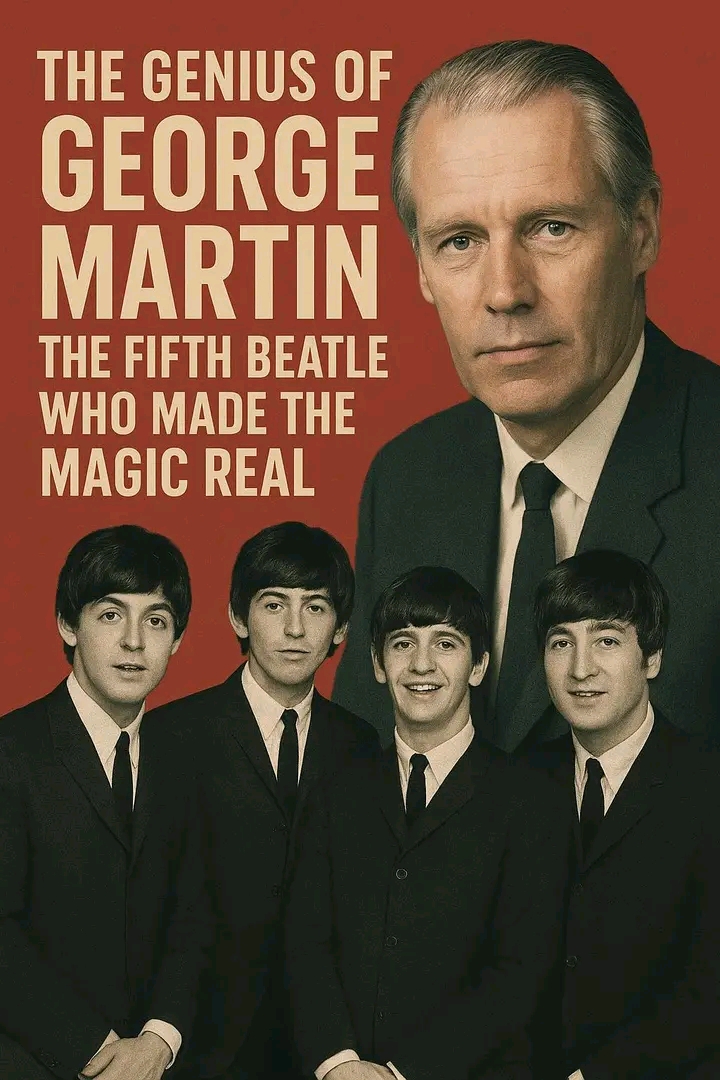The Genius of George Martin: The Fifth Beatle Who Made the Magic Real
The Beatles are etched into history as one of the most revolutionary bands of all time—four young men from Liverpool whose music and cultural influence reshaped the world. John Lennon, Paul McCartney, George Harrison, and Ringo Starr are celebrated as icons, yet behind their meteoric rise was a man whose genius and vision played an indispensable role: George Martin. Often heralded as “the Fifth Beatle,” Martin’s contributions extended far beyond that of a typical record producer. His innovative approach, musical expertise, and unwavering support transformed the Beatles from talented musicians into legendary artists.
Early Life and Musical Foundations
George Martin was born in 1926 in London, into a musical family. His father was a pianist and bandleader, which exposed young George to music from an early age. He studied piano and oboe, and his formal classical training laid the groundwork for his future innovations in the studio. After serving in the Royal Navy during World War II, Martin pursued a career in music production, working with various artists before crossing paths with the Beatles.
The Collaboration Begins
In 1962, the Beatles signed with EMI’s Parlophone label, where Martin was the head of A&R. Recognizing their raw talent but also their need for guidance, Martin’s initial role was to shape their sound and help craft a distinctive musical identity. From the outset, he saw potential in their energy and songwriting but also recognized the importance of pushing musical boundaries.
Innovative Studio Techniques
George Martin’s influence is perhaps most evident in his innovative studio techniques. He was a pioneer in multi-tracking, allowing multiple instruments and vocals to be recorded separately and layered together. This technique enabled the Beatles to create complex arrangements that were revolutionary at the time.
For instance, on “Tomorrow Never Knows,” Martin helped realize a psychedelic soundscape using tape loops and backward recordings, pushing the limits of what was possible in the studio. Similarly, the orchestral crescendos in “A Day in the Life” and the use of unconventional instruments in “Eleanor Rigby” showcased Martin’s inventive spirit.
Mentorship and Artistic Guidance
Beyond technical innovations, Martin served as a mentor and musical translator for the band. While Lennon and McCartney were prolific songwriters, they often relied on Martin’s classical training and musical knowledge to refine their ideas. He suggested arrangements, orchestrations, and production techniques that elevated their songs from simple tunes to complex, layered masterpieces.
His ability to understand and nurture the band’s vision while adding his own creative insights was crucial. He encouraged experimentation, which resulted in groundbreaking albums like Rubber Soul, Revolver, Sgt. Pepper’s Lonely Hearts Club Band, and The Beatles (the “White Album”).
The Visionary Producer
George Martin’s role extended into the production of some of the Beatles’ most iconic tracks. He was instrumental in the creation of “Strawberry Fields Forever,” with its innovative psychedelic production, and “All You Need Is Love,” which incorporated classical, jazz, and experimental sounds into a pop context.
His classical background allowed him to introduce elements like string quartets, brass sections, and unconventional instrumentation, seamlessly integrating them into pop music. This blending of genres helped redefine what popular music could be.
Legacy and Recognition
Throughout their career, the Beatles and Martin maintained a close working relationship. Their collaborations not only produced timeless music but also changed the landscape of recording and production. Martin’s influence extended beyond the Beatles, shaping the evolution of modern music production techniques.
In recognition of his contributions, Martin was knighted in 1966 and received numerous awards, including Grammy Trustees Awards and an induction into the Rock and Roll Hall of Fame as a non-performer.
A Quiet Genius Who Made the Magic Real
George Martin’s story is one of quiet brilliance—an unsung hero whose creative vision turned the Beatles’ raw talent into legendary artistry. His mastery of the studio and his willingness to experiment with sound helped craft some of the most beloved and innovative albums in music history.
As the “Fifth Beatle,” Martin’s legacy endures. His groundbreaking work not only transformed the Beatles’ sound but also set new standards for music production. Today, he is remembered as a pioneer whose genius made the magic of The Beatles truly real, forever shaping the future of popular music.



